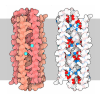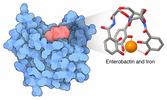+ Open data
Open data
- Basic information
Basic information
| Entry | Database: PDB / ID: 7zeu | ||||||
|---|---|---|---|---|---|---|---|
| Title | Crystal structure of human Clusterin, crystal form II | ||||||
 Components Components | Clusterin | ||||||
 Keywords Keywords | CHAPERONE / molecular chaperone / complement system / Alzheimer's disease | ||||||
| Function / homology |  Function and homology information Function and homology informationimmune complex clearance / perinuclear endoplasmic reticulum lumen / regulation of neuronal signal transduction / positive regulation of neurofibrillary tangle assembly / central nervous system myelin maintenance / response to misfolded protein / negative regulation of response to endoplasmic reticulum stress / spherical high-density lipoprotein particle / Terminal pathway of complement / protein targeting to lysosome involved in chaperone-mediated autophagy ...immune complex clearance / perinuclear endoplasmic reticulum lumen / regulation of neuronal signal transduction / positive regulation of neurofibrillary tangle assembly / central nervous system myelin maintenance / response to misfolded protein / negative regulation of response to endoplasmic reticulum stress / spherical high-density lipoprotein particle / Terminal pathway of complement / protein targeting to lysosome involved in chaperone-mediated autophagy / protein carrier chaperone / chromaffin granule / regulation of amyloid-beta clearance / microglial cell proliferation / reverse cholesterol transport / misfolded protein binding / negative regulation of intrinsic apoptotic signaling pathway in response to DNA damage / apical dendrite / protein import / complement activation / positive regulation of ubiquitin-dependent protein catabolic process / negative regulation of amyloid fibril formation / Antimicrobial peptides / neurofibrillary tangle / low-density lipoprotein particle receptor binding / positive regulation of amyloid fibril formation / positive regulation of amyloid-beta formation / negative regulation of release of cytochrome c from mitochondria / amyloid-beta clearance / negative regulation of amyloid-beta formation / complement activation, classical pathway / chaperone-mediated protein complex assembly / negative regulation of protein-containing complex assembly / positive regulation of intrinsic apoptotic signaling pathway / : / intrinsic apoptotic signaling pathway / platelet alpha granule lumen / Regulation of Complement cascade / release of cytochrome c from mitochondria / positive regulation of protein-containing complex assembly / microglial cell activation / positive regulation of NF-kappaB transcription factor activity / positive regulation of receptor-mediated endocytosis / lipid metabolic process / response to virus / tau protein binding / cell morphogenesis / positive regulation of nitric oxide biosynthetic process / positive regulation of tumor necrosis factor production / unfolded protein binding / positive regulation of proteasomal ubiquitin-dependent protein catabolic process / Platelet degranulation / regulation of cell population proliferation / protein-folding chaperone binding / : / amyloid-beta binding / regulation of apoptotic process / blood microparticle / negative regulation of neuron apoptotic process / mitochondrial inner membrane / protein stabilization / positive regulation of apoptotic process / receptor ligand activity / signaling receptor binding / innate immune response / intracellular membrane-bounded organelle / synapse / ubiquitin protein ligase binding / positive regulation of gene expression / protein-containing complex binding / perinuclear region of cytoplasm / cell surface / Golgi apparatus / protein-containing complex / mitochondrion / extracellular space / extracellular exosome / extracellular region / nucleus / cytoplasm / cytosol Similarity search - Function | ||||||
| Biological species |  Homo sapiens (human) Homo sapiens (human) | ||||||
| Method |  X-RAY DIFFRACTION / X-RAY DIFFRACTION /  SYNCHROTRON / SYNCHROTRON /  MOLECULAR REPLACEMENT / MOLECULAR REPLACEMENT /  molecular replacement / Resolution: 3.5 Å molecular replacement / Resolution: 3.5 Å | ||||||
 Authors Authors | Yuste-Checa, P. / Bracher, A. / Hartl, F.U. | ||||||
| Funding support | 1items
| ||||||
 Citation Citation |  Journal: Nat.Struct.Mol.Biol. / Year: 2025 Journal: Nat.Struct.Mol.Biol. / Year: 2025Title: Structural analyses define the molecular basis of clusterin chaperone function. Authors: Yuste-Checa, P. / Carvajal, A.I. / Mi, C. / Paatz, S. / Hartl, F.U. / Bracher, A. #1:  Journal: Biorxiv / Year: 2024 Journal: Biorxiv / Year: 2024Title: Hydrophobic tails enable diverse functions of the extracellular chaperone clusterin Authors: Yuste-Checa, P. / Carvajal, A.I. / Mi, C. / Paatz, S. / Ulrich Hartl, F. / Bracher, A. | ||||||
| History |
|
- Structure visualization
Structure visualization
| Structure viewer | Molecule:  Molmil Molmil Jmol/JSmol Jmol/JSmol |
|---|
- Downloads & links
Downloads & links
- Download
Download
| PDBx/mmCIF format |  7zeu.cif.gz 7zeu.cif.gz | 165 KB | Display |  PDBx/mmCIF format PDBx/mmCIF format |
|---|---|---|---|---|
| PDB format |  pdb7zeu.ent.gz pdb7zeu.ent.gz | 128.9 KB | Display |  PDB format PDB format |
| PDBx/mmJSON format |  7zeu.json.gz 7zeu.json.gz | Tree view |  PDBx/mmJSON format PDBx/mmJSON format | |
| Others |  Other downloads Other downloads |
-Validation report
| Summary document |  7zeu_validation.pdf.gz 7zeu_validation.pdf.gz | 1.6 MB | Display |  wwPDB validaton report wwPDB validaton report |
|---|---|---|---|---|
| Full document |  7zeu_full_validation.pdf.gz 7zeu_full_validation.pdf.gz | 1.6 MB | Display | |
| Data in XML |  7zeu_validation.xml.gz 7zeu_validation.xml.gz | 26.6 KB | Display | |
| Data in CIF |  7zeu_validation.cif.gz 7zeu_validation.cif.gz | 35.3 KB | Display | |
| Arichive directory |  https://data.pdbj.org/pub/pdb/validation_reports/ze/7zeu https://data.pdbj.org/pub/pdb/validation_reports/ze/7zeu ftp://data.pdbj.org/pub/pdb/validation_reports/ze/7zeu ftp://data.pdbj.org/pub/pdb/validation_reports/ze/7zeu | HTTPS FTP |
-Related structure data
| Related structure data |  7zetSC S: Starting model for refinement C: citing same article ( |
|---|---|
| Similar structure data | Similarity search - Function & homology  F&H Search F&H Search |
- Links
Links
- Assembly
Assembly
| Deposited unit | 
| ||||||||
|---|---|---|---|---|---|---|---|---|---|
| 1 | 
| ||||||||
| 2 | 
| ||||||||
| Unit cell |
|
- Components
Components
| #1: Protein | Mass: 47038.852 Da / Num. of mol.: 2 / Fragment: Clu-delta(214-238) / Mutation: deletion(214-238) Source method: isolated from a genetically manipulated source Source: (gene. exp.)  Homo sapiens (human) / Gene: CLU, APOJ, CLI, KUB1, AAG4 / Plasmid: pB-T-PAF / Cell line (production host): HEK293T / Production host: Homo sapiens (human) / Gene: CLU, APOJ, CLI, KUB1, AAG4 / Plasmid: pB-T-PAF / Cell line (production host): HEK293T / Production host:  Homo sapiens (human) / References: UniProt: P10909 Homo sapiens (human) / References: UniProt: P10909#2: Polysaccharide | 2-acetamido-2-deoxy-beta-D-glucopyranose-(1-4)-2-acetamido-2-deoxy-beta-D-glucopyranose Source method: isolated from a genetically manipulated source #3: Sugar | ChemComp-NAG / Has ligand of interest | N | Has protein modification | Y | |
|---|
-Experimental details
-Experiment
| Experiment | Method:  X-RAY DIFFRACTION / Number of used crystals: 1 X-RAY DIFFRACTION / Number of used crystals: 1 |
|---|
- Sample preparation
Sample preparation
| Crystal | Density Matthews: 2.97 Å3/Da / Density % sol: 58.53 % / Mosaicity: 0.29 ° |
|---|---|
| Crystal grow | Temperature: 277 K / Method: vapor diffusion, sitting drop / pH: 5 / Details: 24% PEG-1500, 20% glycerol |
-Data collection
| Diffraction | Mean temperature: 100 K / Serial crystal experiment: N | ||||||||||||||||||||||||||||||
|---|---|---|---|---|---|---|---|---|---|---|---|---|---|---|---|---|---|---|---|---|---|---|---|---|---|---|---|---|---|---|---|
| Diffraction source | Source:  SYNCHROTRON / Site: SYNCHROTRON / Site:  ESRF ESRF  / Beamline: ID23-1 / Wavelength: 0.7749 Å / Beamline: ID23-1 / Wavelength: 0.7749 Å | ||||||||||||||||||||||||||||||
| Detector | Type: DECTRIS EIGER X 16M / Detector: PIXEL / Date: Dec 2, 2021 | ||||||||||||||||||||||||||||||
| Radiation | Protocol: SINGLE WAVELENGTH / Monochromatic (M) / Laue (L): M / Scattering type: x-ray | ||||||||||||||||||||||||||||||
| Radiation wavelength | Wavelength: 0.7749 Å / Relative weight: 1 | ||||||||||||||||||||||||||||||
| Reflection | Resolution: 3.5→48.59 Å / Num. obs: 14413 / % possible obs: 99.8 % / Redundancy: 7.2 % / Biso Wilson estimate: 108.57 Å2 / CC1/2: 0.995 / Rmerge(I) obs: 0.211 / Rpim(I) all: 0.085 / Rrim(I) all: 0.229 / Net I/σ(I): 6.1 / Num. measured all: 103733 / Scaling rejects: 23 | ||||||||||||||||||||||||||||||
| Reflection shell | Diffraction-ID: 1
|
-Phasing
| Phasing | Method:  molecular replacement molecular replacement | ||||||
|---|---|---|---|---|---|---|---|
| Phasing MR | R rigid body: 0.582
|
- Processing
Processing
| Software |
| ||||||||||||||||||||||||||||||||||||||||||
|---|---|---|---|---|---|---|---|---|---|---|---|---|---|---|---|---|---|---|---|---|---|---|---|---|---|---|---|---|---|---|---|---|---|---|---|---|---|---|---|---|---|---|---|
| Refinement | Method to determine structure:  MOLECULAR REPLACEMENT MOLECULAR REPLACEMENTStarting model: 7ZET Resolution: 3.5→29.77 Å / SU ML: 0.5 / Cross valid method: THROUGHOUT / σ(F): 1.34 / Phase error: 35.05 / Stereochemistry target values: ML Details: The Clusterin construct is a glyco-protein, which was expressed in the presence of the alpha-mannosidase I inhibitor kifunensine. Kifunensine prevents trimming of mannose moieties, resulting ...Details: The Clusterin construct is a glyco-protein, which was expressed in the presence of the alpha-mannosidase I inhibitor kifunensine. Kifunensine prevents trimming of mannose moieties, resulting in oligo-mannose N-glycans, and thereby prevents processing to mature complex N-glycans (Chang et al., Structure 15, 267(2007), Fig. 1B). Asn residues 86, 103, 145, 291, 354 and 374 are expected to carry predominantly NAG-NAG-BMA-(3->1)MAN-MAN-MAN (6->1)-MAN (3->1)MAN-MAN (6->1)MAN-MAN N-glycan trees (Chang et al., Structure 15, 267(2007), Fig. 1B).
| ||||||||||||||||||||||||||||||||||||||||||
| Solvent computation | Shrinkage radii: 0.9 Å / VDW probe radii: 1.11 Å / Solvent model: FLAT BULK SOLVENT MODEL | ||||||||||||||||||||||||||||||||||||||||||
| Displacement parameters | Biso max: 264.62 Å2 / Biso mean: 137.2869 Å2 / Biso min: 53.43 Å2 | ||||||||||||||||||||||||||||||||||||||||||
| Refinement step | Cycle: final / Resolution: 3.5→29.77 Å
| ||||||||||||||||||||||||||||||||||||||||||
| LS refinement shell | Refine-ID: X-RAY DIFFRACTION / Rfactor Rfree error: 0 / Total num. of bins used: 5
|
 Movie
Movie Controller
Controller



 PDBj
PDBj




